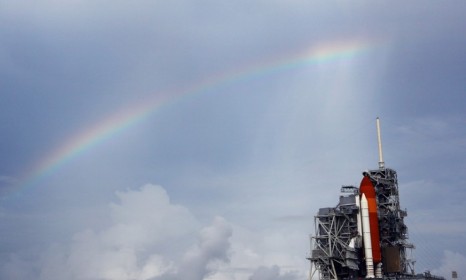Can NASA survive without the shuttle program?
NASA has big plans for life after the space shuttle retires. But can it turn them into reality?

A free daily email with the biggest news stories of the day – and the best features from TheWeek.com
You are now subscribed
Your newsletter sign-up was successful
As NASA prepares for the last flight of the 30-year space shuttle program, astronauts and scientists are leaving the space agency in droves. The brain drain threatens to undermine what is already an uncertain future for NASA once the shuttle Atlantis completes its final trip. And for the foreseeable future, the U.S. will have to pay Russia to carry astronauts into orbit on Soyuz rockets. Where will America's space program go from here?
NASA is in real trouble: With the shuttle's retirement, the U.S. is "looking at a yawning gap in human spaceflight," says Martin Barstow, a Leicester University space science professor, as quoted by Britain's Guardian. It could be a decade before NASA gets astronauts aloft again, and in the meantime, America's appetite for space exploration could fade. "It may come back, but I see a lot of things losing momentum."
"Space shuttle retirement leaves 'yawning gap' in human spaceflight"
The Week
Escape your echo chamber. Get the facts behind the news, plus analysis from multiple perspectives.

Sign up for The Week's Free Newsletters
From our morning news briefing to a weekly Good News Newsletter, get the best of The Week delivered directly to your inbox.
From our morning news briefing to a weekly Good News Newsletter, get the best of The Week delivered directly to your inbox.
Actually, this will free NASA to shoot higher: "We were in much the same place in the 1970s," says Phil Plait in the New York Post, when people were predicting the space agency's demise after the end of the Apollo moon shots. Then along came the shuttle, and NASA's mission changed to making low-orbit flight more routine. Now, with private companies able to take over launches to low orbit, NASA will be "free to pursue literally loftier goals," sending humans farther into space than ever before.
Don't be too quick to buy NASA's rosy outlook: NASA leaders insist the space agency will fund private companies that will send astronauts to low-Earth orbit, says Eric Berger at the Houston Chronicle, while it works on sending people to Mars a couple decades down the road. "It all sounds great," but it won't be easy to develop the kind of heavy-lift rocket we'll need to go deeper into space. "NASA doesn't exactly have a good history of sticking with the development of new programs." So it's hard to be too confident that NASA's future is as bright as it says.
"Are you buying NASA’s happy talk on the future of human spaceflight?"
A free daily email with the biggest news stories of the day – and the best features from TheWeek.com